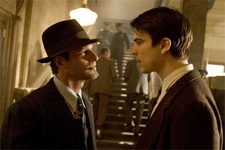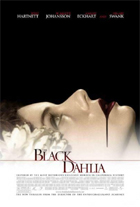The Black Dahlia
|  Ever since the bisected body of a murdered would-be starlet named Elizabeth Short was found in a field in the Leimert Park neighborhood of Los Angeles on January 15, 1947, the American public has maintained a morbid fascination with the grisly mystery. Questions about who killed the 22-year-old who became known as “The Black Dahlia” rank just shy of similar ones about Jack the Ripper, especially since the passage of time has virtually guaranteed that it will never be known for sure. Ever since the bisected body of a murdered would-be starlet named Elizabeth Short was found in a field in the Leimert Park neighborhood of Los Angeles on January 15, 1947, the American public has maintained a morbid fascination with the grisly mystery. Questions about who killed the 22-year-old who became known as “The Black Dahlia” rank just shy of similar ones about Jack the Ripper, especially since the passage of time has virtually guaranteed that it will never be known for sure.Over the years there have been thousands of newspaper and magazine articles, countless books and novels, several movies, a video game, and even a 12-part symphonic suite composed by writer-producer-saxophonist Bob Belden. All of this output has done nothing to confirm the killer’s true identity, although there have been two books in which the authors claimed their own fathers were the killer: Janice Knowlton in her less-than-credible and exploitatively titled 1995 screed Daddy Was the Black Dahlia Killer and Steven Hodel, a former L.A. homicide detective turned private investigator, in his more believable, though still questionable, Black Dahlia Avenger: A Genius for Murder. Now we have Brian De Palma’s The Black Dahlia, which is based on the celebrated 1988 novel by James Ellroy (part of his L.A. trilogy, which also includes L.A. Confidential). I have not read Ellroy’s novel, but what I have read about it paints it as a dark, disturbing, and deadly serious exposé of the dark underbelly of Hollywood in the post-war era. If Amazon.com reviewers are to be believed (and I have found many of them to be quite perceptive), the book is almost unrelievedly grim. The same cannot be said for De Palma’s film, which veers wildly from dark and grimy to strangely campy. It is an intriguing middle ground between De Palma’s superior independent films like Femme Fatale (2002), which often thumb their noses at movie conventions, and his less dependable Hollywood-for-hire work like Mission to Mars (2000), which strain to be mainstream and usually fail spectacularly. Not surprisingly, The Black Dahlia is at its best when De Palma cuts completely loose and lets the story slide into the loony bin; otherwise, it tends to play like any other contemporary neo-noir, albeit with a little more visual flair. Josh Hartnett and Aaron Eckhart star as Dwight “Bucky” Bleichert and Leland “Lee” Blanchard, two L.A. police detectives who share both similarly sounding last names and pugilist pasts. They are both in love with Lee’s sweetheart, Kay Lake (Scarlett Johnansson), who harbors a dark past and may yet have darkness in her future. Bucky and Lee begin investigating the murder of Elizabeth Short (Mia Kirschner), who is seen alive only via black-and-white movie reels of her audition films (the voice we hear speaking off-screen is De Palma’s), as well as some less-savory cinematic experimentation. In the process, Bucky becomes involved with Madeleine Linscott (Hilary Swank), the rebellious daughter of a corrupt Hollywood construction tycoon (John Kavanagh) and his loopy, heavily medicated wife (Fiona Shaw). Like most noir, The Black Dahlia slowly, but irretrievably descends into a spiraling morass of crime, corruption, and eventual insanity. While the project was originally developed by David Fincher (Seven), De Palma has done quite a bit to make it his own, although his presence tends to be felt only in fits and starts. For long stretches of the film, it feels as though anyone could have directed it. Then, we get an immediately recognizable De Palma moment, such as the extended, unbroken crane shot that begins with Bucky and Lee on a stakeout, follows as a woman discovers the severed body of Elizabeth Short, and then completes a nearly 360-degree track by picking up the object of the stakeout. The film is at its most De Palma-esque during a murder sequence on a marble staircase that feels like a twisted mash-up of the train station sequence in The Untouchables (1987) and the elevator razor murder in Dressed to Kill (1980). It’s a bravura piece of filmmaking of complete and utter stylistic excess. Yet, for those who insist that De Palma is a director of empty aesthetics, The Black Dahlia is replete with moments of deep-seated guilt and scenes that reverberate with the trickle-down effects of social violence. The film is never so powerful as when Bucky discovers an entire family, including a young child, brutally slaughtered by a sex offender he and Lee stopped pursuing in order to investigate the more glamorous Black Dahlia murder. What The Black Dahlia doesn’t do so well is tell a comprehensible story; it’s engaging all right, but it never really pulls together. Ellroy’s novel was adapted by screenwriter Josh Friedman (War of the Worlds) with far less success than Brian Helgeland and Curtis Hanson had with L.A. Confidential (1997), which remains a pinnacle of how to adapt a complex, sprawling novel into a comprehensible screenplay. The Black Dahlia throws a lot of characters at the audience, many of whom seem either unnecessary or fleeting, and then tries to tie them all together in one grand finale that is somehow overly explanatory and confusing at the same time. What you take away from in the end is that the film is primarily a savage jab at debased American aristocracy and how its hypocrisy is but a thin veil for more deadly inclinations. The film ultimately resorts to a “talking villain” scene, which is an unfortunate staple of too many mysteries. However, De Palma amusingly undercuts its clichéd qualities by staging it as an even more deranged riff on Norma Desmond from Sunset Boulevard (1950). In letting the insanity not just rise to the surface, but literally kidnap the story, he humorously overstates its centrality to film noir, making The Black Dahlia both a studious new entry to the genre and a schizophrenic parody of it. Copyright ©2006 James Kendrick Thoughts? E-mail James Kendrick All images copyright ©2006 Universal Pictures |
Overall Rating: 

 (3)
(3)


